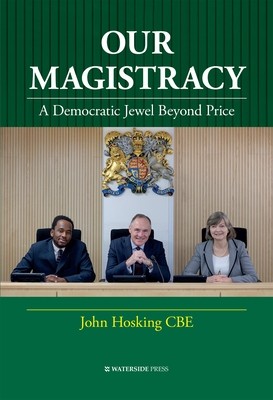
- We will send in 10–14 business days.
- Author: John Hosking
- Publisher: Waterside Press
- ISBN-10: 190997675X
- ISBN-13: 9781909976757
- Format: 15.6 x 23.4 x 1.9 cm, kieti viršeliai
- Language: English
- SAVE -10% with code: EXTRA
Reviews
Description
In this thoroughly informed account of the magistracy the author deals with key issues touching on that institution. Focussing on what Lord Bingham, Lord Chief Justice, described as a 'democratic jewel beyond price', he explains its rationale, goals and over-riding values. Dealing with major developments, economics, management, day-to-day practicalities and changing times the author casts an experienced eye over summary justice, law and order and its fascinating history of local administration.
Describing the magistracy as a great national institution, independent, respected and a true people's court, John Hosking nevertheless decries a halving of its size, closure of courthouses, remote services and increasing reliance on professional judges rather than community volunteers. Though much has changed for the better to increase competency, meet criticism and maintain integrity, the book explains how other developments have challenged the very status of the lay magistracy and made inroads into one of the most cherished principles of our democracy: public participation in the justice system.
EXTRA 10 % discount with code: EXTRA
The promotion ends in 23d.17:02:53
The discount code is valid when purchasing from 10 €. Discounts do not stack.
- Author: John Hosking
- Publisher: Waterside Press
- ISBN-10: 190997675X
- ISBN-13: 9781909976757
- Format: 15.6 x 23.4 x 1.9 cm, kieti viršeliai
- Language: English English
In this thoroughly informed account of the magistracy the author deals with key issues touching on that institution. Focussing on what Lord Bingham, Lord Chief Justice, described as a 'democratic jewel beyond price', he explains its rationale, goals and over-riding values. Dealing with major developments, economics, management, day-to-day practicalities and changing times the author casts an experienced eye over summary justice, law and order and its fascinating history of local administration.
Describing the magistracy as a great national institution, independent, respected and a true people's court, John Hosking nevertheless decries a halving of its size, closure of courthouses, remote services and increasing reliance on professional judges rather than community volunteers. Though much has changed for the better to increase competency, meet criticism and maintain integrity, the book explains how other developments have challenged the very status of the lay magistracy and made inroads into one of the most cherished principles of our democracy: public participation in the justice system.


Reviews